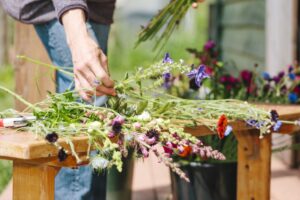 Foraging. It’s a word that often makes people think of living off the environment in a remote cabin in the woods. However, those with sizable properties aren’t the only ones who can forage. It’s a terrific idea to forage both inside and outside the city! This page discusses the meaning of urban and suburban foraging, its legality, and how to begin foraging in your own community.
Foraging. It’s a word that often makes people think of living off the environment in a remote cabin in the woods. However, those with sizable properties aren’t the only ones who can forage. It’s a terrific idea to forage both inside and outside the city! This page discusses the meaning of urban and suburban foraging, its legality, and how to begin foraging in your own community.
What is Urban Foraging?
The act of picking wild plants and mushrooms that are flourishing in your immediate vicinity is known as urban foraging, sometimes known as city foraging. Several of these plants can be used to make teas, medications, or foods, or can even be eaten. For instance, acorns from the many trees that grow across the city can be roasted or crushed into flour, and dandelions from your neighborhood park may be eaten.
Even young TikTok influencers and users are developing an interest in foraging. There have been tens of millions of views on social media videos about foraging, and many internet users have adopted the habit to supplement their diet. Besides, why not? Learning about nature and getting to know the environment better can be accomplished through foraging. In addition, you might be able to bring home some naturally occurring foods that haven’t been sprayed with pesticides or chemically treated.
Is Urban Foraging Legal?
On public land, most of the time, it is legal to collect wild mushrooms, plants, nuts, and fruits. This would include riverbanks and creeks, parks, the grounds around the city buildings, walkways and sidewalks, and other available areas around urban or suburban environments. You can also utilize maps such as those provided by FallingFruit.org to identify foraging places in your area. However, you ought to regularly review local laws and property records. In certain areas, some foraging practices could be limited or outright forbidden.
Additionally, it’s critical to respect private property boundaries and just access with permission from the owner. If you first obtain permission from the landowner, some people might let you take nuts, fruit, and other food from their land. It’s possible that the local property owners, including your neighbors, have extra produce that they’d be keen to share.
How to Get Started
Urban foraging is a stimulating and rewarding activity. For starters, you ought to learn what plants grow in that area by looking online or speaking with wild food enthusiasts, botanists, or local gardeners. If you’re interested in learning more about the plants that could be found in your area, you could take a class on plant identification or join a local outdoor club.
It is essential to utilize ethical harvesting techniques which care for the environment and other people who may use the land when you venture out. Take only what you need for your own use unless it is freely offered to you and you want to share it with others.
It would be good to invest in some basic foraging supplies, like a reusable bag or basket, pruning shears or a small knife, compact containers to segregate your plants and keep them from getting squished, and a paper bag (for mushrooms since keeping them in plastic can make them slimy).
Lastly, resist harvesting in locations where chemical fertilizers or pesticides have been used. Locations beside heavy car traffic or places of agricultural runoff such as orchards, factories, and farm fields are prone to be polluted with chemicals. Golf courses or other lawns that may have undergone pesticides are included. If you want to find out if the area you want to forage has been treated, try asking your local authorities or the landowner. For safety, make sure to cleanse all your foraged harvest thoroughly and prepare them carefully before serving.
Foraging is a terrific way of taking part in nature, understanding the local plants, and even receiving some free food! Since you know where to start, you can forage in your very own suburb or city. Who knows, you could uncover a forager’s dream just in your backyard!
Are you planning on moving? Go over the best rental list in your region by contacting your local Real Property Management!
We are pledged to the letter and spirit of U.S. policy for the achievement of equal housing opportunity throughout the Nation. See Equal Housing Opportunity Statement for more information.


